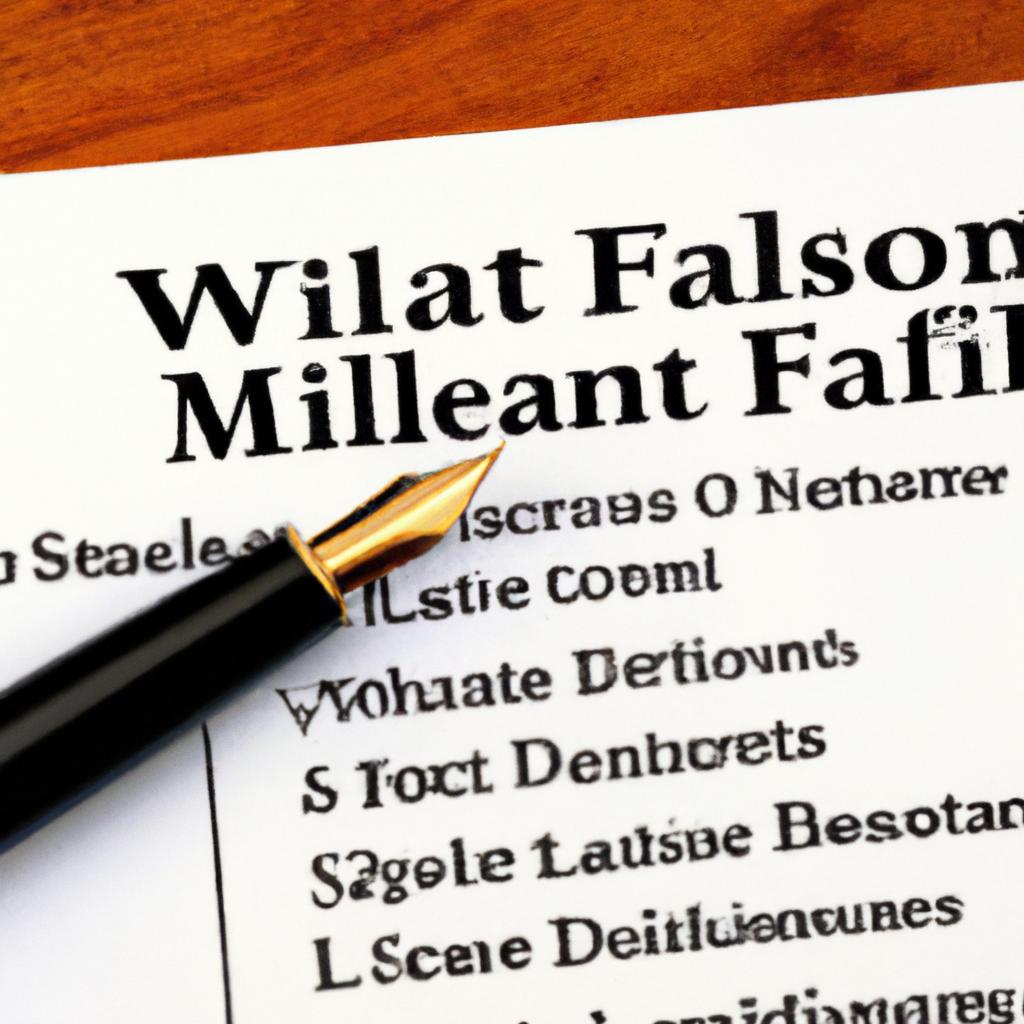In the intricate web of estate planning, the validity of a will stands as a cornerstone. However, amidst the meticulous drafting and execution of such crucial documents, the specter of an “invalid will” looms ominously. This article delves into the complexities and potential pitfalls that surround the creation of a will, shedding light on the various scenarios and legal intricacies that may render a testamentary instrument null and void. As seasoned practitioners in the realm of estate law, the team at Morgan Legal Group in New York City is well-versed in navigating the maze of invalid wills, offering expert insights and solutions to ensure the efficacy and legality of your testamentary intentions.
Understanding the implications of an invalid will
When a will is deemed invalid, it can have significant implications for the distribution of assets and the wishes of the deceased individual. It is essential to understand the potential consequences of an invalid will to ensure that the estate is handled properly and in accordance with the law.
Some of the key implications of an invalid will include:
- Intestacy laws may apply: If a will is declared invalid, the estate may be subject to intestacy laws, which determine how assets are distributed when there is no valid will in place.
- Contested probate proceedings: An invalid will can lead to contested probate proceedings, where interested parties dispute the validity of the document and the distribution of assets.

Key factors that may render a will invalid
When creating a will, it is crucial to ensure that it meets all legal requirements to avoid any potential challenges or disputes in the future. There are , leaving your final wishes vulnerable to being contested. Understanding these factors is essential for proper estate planning.
<p>One common factor that may invalidate a will is lack of capacity. This means that the testator, the person creating the will, must be of sound mind and understand the implications of their actions. Additionally, undue influence from a third party can also render a will invalid. If it can be proven that someone exerted pressure or coercion on the testator to change their will, it could be contested in court.</p>
Common mistakes to avoid when drafting a will
When drafting a will, it is crucial to avoid common mistakes that can lead to the document being deemed invalid. One of the most common mistakes is failing to follow the necessary legal formalities. A will must meet specific requirements in order to be considered valid, such as being in writing, signed by the testator, and witnessed by at least two witnesses who are not beneficiaries.
Another common mistake to avoid is failing to update your will regularly. Life circumstances can change, such as marriage, divorce, birth of children, or acquisition of assets, which may warrant changes to your will. Failing to update your will can lead to unintended consequences and disputes among beneficiaries. It is important to review and update your will periodically to ensure it accurately reflects your wishes.

Seeking legal guidance to prevent the invalidation of your will
When it comes to ensuring that your last wishes are carried out as you intended, having a legally valid will is essential. If your will is found to be invalid, your assets may not be distributed according to your wishes, potentially causing unnecessary stress and conflict among your loved ones. is crucial to avoid this scenario.
At Morgan Legal Group, our team of experienced attorneys specializes in estate planning and can provide you with the guidance you need to ensure that your will is valid and legally binding. From properly drafting your will to ensuring that all legal requirements are met, we will work with you every step of the way to protect your assets and your loved ones. Don’t leave your final wishes to chance – contact us today to schedule a consultation and secure the future of your estate.
Q&A
Q: What is an “invalid will”?
A: An invalid will is a legal document that does not meet the requirements set forth by the law to be considered legally binding.
Q: What are some common reasons a will may be deemed invalid?
A: Common reasons for invalid wills include lack of capacity of the testator (person making the will), undue influence, fraud, improper execution, and failure to adhere to legal formalities.
Q: How can someone ensure that their will is valid?
A: To ensure a will is valid, it is essential to follow legal requirements, such as having witnesses present during the signing of the document, ensuring the testator is of sound mind, and clearly expressing wishes for distribution of assets.
Q: What are the consequences of having an invalid will?
A: If a will is deemed invalid, the estate of the deceased may be distributed according to state laws, rather than the deceased’s wishes outlined in the will. This can lead to potential disputes and complications among beneficiaries.
Q: Can an invalid will be challenged in court?
A: Yes, an invalid will can be challenged in court by interested parties, such as beneficiaries or heirs who stand to be negatively affected by the terms of the will. It is important to seek legal advice in such cases.
The Conclusion
In conclusion, understanding the legal requirements for a valid will is essential to ensure that your final wishes are properly executed. Invalid wills can lead to confusion, disputes, and potential issues for your loved ones. By seeking guidance from a legal professional and following the necessary steps, you can create a will that accurately reflects your intentions and provides peace of mind for you and your family. Remember, it’s never too early to start planning for the future.
 Invalid Wills: Everything You Need to Know
Invalid Wills: Everything You Need to Know
A will is a legally binding document that dictates how a person’s assets will be distributed after their passing. It is meant to provide peace of mind and ensure that one’s final wishes are carried out. However, not all wills are considered valid by the court. In fact, there are certain requirements that must be met in order for a will to be considered valid. In this article, we’ll explore what constitutes an invalid will, its potential consequences, and what can be done to avoid such a situation.
What is an Invalid Will?
An invalid will is a will that does not meet the legal requirements set by the state. These requirements may vary from state to state, but there are certain criteria that are generally followed. The most common reasons for a will to be deemed invalid are:
1. Lack of Mental Capacity: In order to draft a valid will, one must be of sound mind and understand the nature of their assets and who should inherit them. If a person is deemed to lack mental capacity at the time of drafting the will, then it may be deemed invalid.
2. Improper Execution: Wills must be executed in a specific way to be considered valid. This includes having the will signed by the testator (the person making the will) in the presence of at least two witnesses who also sign the document. If there are any irregularities in the execution of the will, it may be deemed invalid.
3. Undue Influence: This refers to a situation where the testator was coerced or pressured into making certain decisions in their will. If it can be proven that the testator did not have complete free will when drafting the will, then it may be considered invalid.
4. Fraud: If it is discovered that the will was procured by fraudulent means, such as forgery or deceit, then it may be invalidated.
5. Revocation: A will can also become invalid if it is revoked by the testator. This can happen if the testator creates a new will, destroys the existing one, or explicitly revokes it in writing.
Consequences of an Invalid Will
If a will is deemed invalid, then it cannot be used to distribute the assets of the deceased. This can have a significant impact on the intended beneficiaries as their ability to inherit may be affected. In such cases, the court will follow the state’s intestate laws to distribute the assets according to a predetermined hierarchy of relatives. This may not align with the testator’s wishes and can lead to disputes and legal battles among family members.
Moreover, an invalid will can also result in delays and increased costs for the beneficiaries, as the court process of intestate succession can be lengthy and expensive.
Avoiding an Invalid Will
One of the best ways to avoid an invalid will is to plan ahead and seek professional legal assistance. An experienced estate planning attorney can guide you through the process, ensuring that all legal requirements are met and your final wishes are properly documented.
Moreover, it is important to regularly review and update your will, especially if there have been any significant changes in your life, such as marriage, divorce, birth of a child, or acquiring new assets. In such cases, it is crucial to make necessary amendments to your will to avoid any potential conflicts.
Another way to avoid an invalid will is to fully understand the requirements for a valid will in your state. This includes knowing the age of majority, the minimum number of witnesses, and the necessary language to be used in the will.
In some cases, a holographic will (a will written entirely in the testator’s handwriting) may be accepted as valid, even if it does not meet all the legal requirements. However, this can vary by state and it is still recommended to seek legal guidance to ensure its validity.
Final Thoughts
In conclusion, a will can be deemed invalid if it does not meet the legal requirements or is challenged in court. This can result in unintended consequences and disputes among family members. To avoid such a situation, it is important to seek professional legal guidance and regularly review and update your will. So if you haven’t already, take the time to properly document your final wishes and ensure that your will is valid and legally binding. After all, it is your legacy and a way to provide for your loved ones even after you are gone.






